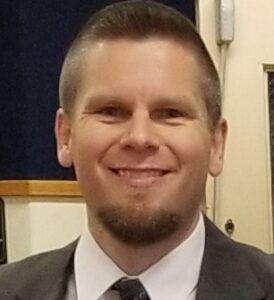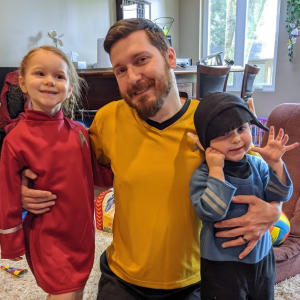Schedule
Wednesday, March 3 | Conference
Morning Plenaries & Keynote
9:00-9:15 AM| Welcome

Dr. Eric Darr, President, Harrisburg University of Science and Technology
9:15-9:30 AM | Opening Remarks

Albert Sarvis, Assistant Professor of Geospatial Technology & Director HU Geospatial Technology Center, Harrisburg University of Science and Technology

Craig Lewis, Geospatial Lab Manager, Harrisburg University of Science and Technology
9:30-10:00 AM| Keynote Address

Henry L. Garie, Chief Data Office and Geographic Information Officer (GIO), City of Philadelphia
Presenter Biography: Hank Garie serves as the Chief Data Officer and Geographic Information Officer (GIO) for the City of Philadelphia. Hank directs the CityGeo/CityData program located in the Office of Innovation and Technology. This program coordinates GIS activities across more than 40 City departments and helps support the integration of spatial and non-spatial data for daily operations and citizen services.
Prior to joining the City in March 2019, Hank served as the first GIO for the State of New Jersey and directed national GIS initiatives in the U.S Department of the Interior. Hank also served as President of the National States Geographic Information Council and as a member of the National Research Council’s Mapping Science Committee.
Presentation Abstract: GIS has become an integral decision support and analysis tool for the City of Philadelphia. Over 45 departments including, water, police, planning, fire, health and many more use place-based analysis and applications to manage daily City operations and emerging issues. Hundreds of spatial data sets can be easily coupled with tabular data using an Enterprise data warehouse (DataBridge) and over 2,000 users access ArcGIS on-line to build problem solving applications. At the center of the action is CityGeo, a team dedicated to coordination, governance, and Enterprise geospatial services.
Insights into how the Nation’s 5th largest City effectively integrates and manages GIS into all aspects of City government will be shared by Hank Garie, Philadelphia’s GIO and Chief Data Officer. Through a series of practical examples, the components that comprise the overall management approach for a successful City GIS program will be shared.
Technical Requirements: None
10:00- 10:15 AM| Break
Breakout Session #1| 10:15- 11:30 AM
Morning Plenaries & Keynote
Track One: Beginner| " Introduction to the ArcGIS API for JavaScript"

Christopher Eby, Senior Application Developer, GeoDecisions
Presenter Biography: Christopher Eby has about 10 years of software development experience focused on web development and modern Javascript frameworks. He has been working in the Harrisburg area since 2011, first at Deloitte Consulting and later at GeoDecisions. Eby has always found GIS fascinating since college where he did research on how to use AI to improve geocoding in rural areas and he now enjoy building GIS based applications at GeoDecisions.
Presentation Description: ArcGIS Online, ArcGIS Experience Builder, and the like are excellent ways to build web interfaces to your ESRI maps but they only get you so far. For the ultimate level of web map flexibility and customization, you will need to use the ArcGIS API for Javascript. This course will walk users through creating a web page that displays an ArcGIS web map using the Javascript API. It will also discuss how the API fits into modern Javascript applications, ArcGIS JS widgets, and when to use the Javascript API.
Technical Requirements: Participants will need access to a PC/laptop
Track Two: Intermediate| "Regular Expressions & Python for Joining GIS-Related Data ""

Christopher Jursa, GISP, GIS Manager, Washington County
Presenter Biography: Chris is a GIS Manager with a GIS Professional (GISP) certification and 18 years of GIS experience including system administration, developing GIS applications, managing enterprise geodatabases, managing online GIS portals and automating geoprocessing workflows with ArcGIS ModelBuilder and Python. Chris have GIS experience in government, consulting and education, in addition to experience in engineering web sites, user interfaces and software with JavaScript, HTML, Java, Classic ASP with VBScript, PHP and ASP.NET with C#.
Presentation Description: While GIS data is commonly available in geodatabase feature classes and shapefiles, GIS-related data can exist in documents such as PDFs, web pages and Excel spreadsheets. If not formatted for immediate use, the data may be recovered in a systematic fashion using search patterns.
This presentation will describe how to access a document, extract text and search for consistent patterns of data with regular expressions in Python. Search patterns to extract letters, numbers and other characters will be described so that attributes such as parcel identifiers can be discovered. The goal is for the audience to see the flexibility of regular expressions to discover data to join to your GIS data as opposed to manual string extractions and other Python string operations that may require multiple lines of code.
Technical Requirements: Python 2.7, ArcGIS Desktop, ArcGIS Pro, Adobe Acrobat, and Excel
Breakout Session #2| 11:45- 12:30 PM
Track One: Beginner| " Introduction to the ArcGIS Python API"

Alexander Brown, Lead Solution Engineer, Esri
Presenter #1 Biography: Alexander Brown works as a Lead Solution Engineer at Esri, supporting customers with their technical needs. He holds a Master of Geographic Information Systems from Penn State University and has over 10 years of GIS experience. Prior to Esri, he worked for the City of Philadelphia as a Geospatial Systems Engineer, providing technical and system architecture guidance for the Office of Technology and various city departments. In addition to his work with the city, Alex has held various positions at NASA Wallops Flight Facility as the facilities’ GIS Administrator/Developer. His current expertise includes system architecture & design, geodatabases, ETL processing, and Web GIS solutions.

Mary McColley, Senior Solution Engineer, Esri
Presenter #2 Biography: Mary McColley works as a Senior Solution Engineer at ESRI, supporting customers with their technical needs. Prior to ESRI, she worked with the Apple Maps and Google Earth platforms for a few years in Silicon Valley. Mary has since returned to the East Coast and is well-established in Philadelphia, PA. She holds a GIS Graduate Certificate, a Bachelor of Arts in Geography, and brings 6+ years of combined professional experience in IT/GIS-based roles. Her expertise lies in UNIX, Linux, Ubuntu, Bash, XML, SQL, ArcGIS Enterprise, ArcSDE, ArcServer, Portal, and CAD. In addition, she is proficient with Python scripting. She enjoys exploring the city and its surrounding areas in her spare time.
Presentation Description: The ArcGIS Python API is a powerful, modern, and easy-to-use Python API for GIS Professionals, developers, organization administrators, content publishers, etc. It expands the ability for users to take advantage of Esri’s spatial analytical capabilities to a number of different clients. The session will introduce the audience to spatial analysis in Jupyter Notebooks, showcase a couple of examples of spatial functions within the API, and highlight additional resources on how to leverage more advanced spatial analytical techniques.
Technical Requirements: None
Track Two: Beginner| "Introduction to GIS for Game Engines"

Justin Schneider, Senior Software Developer, Rainbow Design Services
Presenter Biography: Justin is a professional application developer by day and a hobbyist game developer by night. His passions include video games, VR, and communicating data spatially when words alone fail.
Presentation Description: With more in-depth GIS data available now than ever before, we can do so much more than draw flat maps and charts. This session will introduce users to set up a project using Unity, a free game engine, importing data, and rendering that data in a basic 3D scene.
Technical Requirements: No software is required, as this is an intro only. If following along, users should have Unity installed, and sign up for a free personal use license ahead of time.
Breakout Session #3| 1:30-2:45 PM
Track One: Intermediate| Due to Unforeseen Circumstances, There Will Not Be a Session in this Slot
Due to unforeseen circumstances, there will not be a Track One breakout session in this time slot. Thank you for understanding.
Track Two: Intermediate| "Creating Multiprocessing Python Scripts in ArcGIS"

James Whitacre, GIS Research Scientist, Carnegie Museum of Natural History, Powdermill Nature Reserve
Speaker Biography: James Whitacre is the GIS Research Scientist for the Carnegie Museum of Natural History where he manages the GIS Lab at Powdermill Nature Reserve, the Museum’s environmental research center, and supports museum staff and affiliated researchers with geospatial technologies and needs.
Presentation Description: “My script takes too long!!” Do you find yourself making this complaint too often? Well, maybe your script would benefit from multiprocessing! If you’re not sure, this session will dive into what multiprocessing is, the different scenarios where multiprocessing workflows can help speed up processing, and how to practically utilize multiprocessing in ArcGIS. You will learn how to move from, “This is so slow…” to “WOW! That was fast!”.
Technical Requirements: ArcGIS Pro 2.5+, Jupyter Notebook, Python 3; Python Code Editor; ArcMap and Python 2 may work, but will not be tested.
Breakout Session #4| 3:00- 3:45 PM
Track One: Beginner| " Engaging Rain Gages"

Presenter #1: Matthew Mercurio, GISP, GTO, CiviMapper
Presenter #1 Biography: Matt is the GTO of CivicMapper, a Pittsburgh-based geospatial technology firm. He has been practicing GIS in SW PA for the past 15 years and more broadly across the US for the past 25 years. The focus of Matt’s current work is using geospatial technology for urban hydrology investigation and stormwater management. Matt is actively involved in the PA GIS community and currently serves as the VP of PAMAGIC.

Presenter #2: Christian Gass, COO, CivicMapper
Presenter #2 Biography: Christian is a geospatial technology developer, map-maker, urban designer, civic tech enthusiast, and co-founder of CivicMapper. Through the application of geographic information systems (GIS), data visualization, 3D-modeling, graphic design, and digital media production tools, Christian help municipalities, non-profits, and business operating in the civic sphere undertake better strategic planning and decision-making using data.
Presentation Description: 3RWW in Western PA has an extensive 30 gage network to collect precipitation data with a record spanning about 20 years. The 3RWW Rainfall tool was created to provide communities throughout Allegheny County use this data—provided in both real-time and historical formats—to design more cost-effective solutions to reduce or eliminate sewage overflows and improve stormwater management.
The 3RWW Rainfall tool provides a new API-based framework to query, retrieve and visualize the measurements of both the raw rain gage data and the calibrated rainfall data. The point observation data are extrapolated to 1km x 1km grids for continuous spatial coverage for all of Allegheny County. In this talk, we will go over system design considerations when working with time-series data, specifically rainfall data, on both the server-side and client-side. We will also address use cases for accessing the records for Real-Time Rainfall, Historic Rainfall, and Calibrated Rainfall via temporal and spatial queries.
We will go over the design and implementation of the data pipelines created to populate the time series databases. The pipelines consist of code and triggers to ingest the 3 data types are they are produced by their systems of record. This tool was designed from the API up. We will talk about making geospatial APIs to support client-side geospatial development. We will cover API documentation and it’s important for advanced data users.
This talk will demo the tool and give an annotated discussion of the specific technology used in the development of this tool including Heroku, Postgres, Mapbox, and JavaScript.
Technical Requirements: Development Environment Web Browser
Track Two: Intermediate| "Updating an Aging Web Mapping Application to a Latest and Greatest Technology Stack"

Chris Saylor, MS, MCTS, GIS Applications Developer, JMT Technology Group
Presenter Biography: Mr. Saylor is based out of JMT’s Harrisburg office and brings GIS and full-stack web/desktop development experience. He specializes in GIS-related development, with years of experience authoring applications that utilize the Esri platform as well as with open-source mapping technologies, such as Leaflet and GeoServer. Chris is also a certified Hyland OnBase API developer.
Presentation Description: Web applications with a mapping component have become increasingly popular over the years. With that popularity comes a growing number of options a developer has when choosing the client-side mapping API, the technology used to generate map layer image tiles, and the back-end storage of spatial data. This sits on top of the other choices a developer must make when writing any web application, such as client-side frameworks (Angular/React/Vue), server-side frameworks (.Net Core/PHP/Django), object-relational mapping libraries (Entity Framework/NHibernate/Dapper) and choice of the database (SQL Server/Oracle/PostGRES). Selecting the correct combination of technologies can be an overwhelming task and the rate at which technology changes can make an application seem obsolete shortly after a release to production.
In 2016, JMT was tasked with writing a web mapping application for Pennsylvania One Call System, Inc. The purpose of the application is to allow users to create projects that will require digging or excavation. The application enables users to draw project boundaries on the map or import a boundary from an uploaded shapefile. This spatial data is saved to the database along with other non-spatial attributes. JMT recently upgraded the application to a “latest and greatest” technology stack. Additionally, we added a RESTful API that exposes most of the CRUD operations available within the application. This provided a rare opportunity to rewrite the application from the ground up, incorporating best practices and patterns learned over the past few years.
This presentation will cover some of the pitfalls, pleasant surprises, and other lessons learned while performing the conversion and refactoring of existing code. The upgraded application uses the following technology stack: .Net Core 3.1/C# (server-side framework), SQL Server, NHibernate (object-relational mapper), Angular 9 (client-side framework), Leaflet (mapping library), Geoserver (map tile creation)
Technical Requirements: None
Breakout Session #5| 4:00-4:45 PM
Track One: Beginner| " Learn the Basics of Version Control with Git"

Patrick McKinney, Lead GIS Analyst/Developer, Cumberland County, Pennsylvania
Presenter Biography: Patrick is a cartographer and developer interested in telling the stories of communities through maps and technology. He has helped local governments and non-profits tell their stories through maps for print, interactive web maps, and websites. In his role with Cumberland County, he develops and manages multiple web mapping applications; creates Python scripts to automate workflows and build custom ArcGIS geoprocessing tools, and provides technical assistance to County departments and municipalities.
Presentation Description: Using Version Control to manage projects is an important skill for any developer. Version Control allows multiple people to work on a project using their own “view” of the files. Teams can use separate branches to fix bugs and add new features. In this session, you will learn Git, a popular Version Control system.
You will learn basic Git commands using the command-line interface. We will also examine different scenarios of how Version Control can be used to manage projects. This session is focused on new developers or those who have not used Git before.
Technical Requirements: Have Git installed. It is available for free at https://git-scm.com/. Having an account on GitHub (https://github.com/) is beneficial, but not required.
Track Two: Beginner| "Collecting and Mapping Features with a GPS Watch and ArcGIS API for JavaScript 4

Jim Lawruk, Senior Web Developer, GeoDecisions
Presenter Biography: Jim Lawruk has worked as a professional software developer since 2002 specializing in .NET/C# and JavaScript. For the past six years he has worked at GeoDecisions, a geospatial technology solutions firm. He has extensive experience with ESRI’s ArcGIS API for JavaScript including versions 3 and 4. He has been the lead developer on several geospatial related applications at PennDOT. He enjoys running and hiking, so check out his GPS routes on Strava.
Presentation Description: Learn how to collect coordinate data using the lap button from your GPS watch, transform and enhance the data into features, and finally display the results on an ESRI Map.
First, attendees will learn how to collect coordinates from all the data recorded by a GPS enabled watch. We will cover how to write code to isolate or filter out the coordinates corresponding to the laps. Then we will transform the coordinate data into features contained in a GeoJSON file. We will then create feature layers to be displayed on an ESRI map. We will cover loading the features into the ArcGIS Server as well as creating a JSON graphics layer without a server. Attendees will learn methods to customize the map and layers using various tools available in the ArcGIS JavaScript API.
Technical Requirements: The course is targeted toward developers or those comfortable reading and editing code. A full set of instructions and source code will be available for review on GitHub. The software used will include the ESRI ArcGIS API for JavaScript and Microsoft’s Visual Studio Code editor. Both are free to use. ESRI’s ArcGIS server will be briefly covered, but is not required to complete the instructions.

HU is committed to providing equal education opportunity and full participation for persons with disabilities. It is HU’s policy that no qualified person be excluded from participating in any HU program or activity, be denied the benefits of any HU program or activity, or otherwise be subject to discrimination regarding any HU program or activity. Should you potentially require an accommodation under the ADA to participate in this program, please email ProfessionalEd@HarrisburgU.edu. Please send your request for an accommodation at least 5 business days in advance of the event or program.